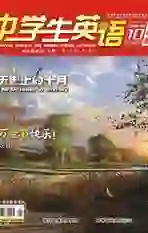反意疑问句讲与练
2012-04-29李国勤
一、概念
反意疑问句是附加在陈述句之后,对陈述句所表示的事实或观点提出疑问的句子,附加疑问实际上是一种简略的一般疑问句。
二、相关知识点精讲
1. 反意疑问句的结构:陈述句(主语 + 谓语……)+ 助动词 / 情态动词 / be动词 + 主语(代词形式)?
说明:陈述句部分如果是肯定句,附加疑问句部分的助动词/情态动词/be动词+not (否定提问);如果陈述句部分是否定句,附加疑问句部分用肯定式提问。例句:
He is your teacher, isn’t he?
People shouldn’t drop litter on the pavements, should they?
You found the key in the bedroom, didn’t you?
They have a house in town, haven’t they? / don’t they?
The boy has to clean his room, doesn’t he?
I am right, aren’t I?
They’d rather go by bus, wouldn’t they?
You’d better change your wet skirt, hadn’t you?
He’d like to join our discussion, wouldn’t he?
She ought to see a doctor at once, shouldn’t she? / oughtn’t she?
2. 某些特殊句型的反意疑问句:
1) 祈使句的反意疑问句:
表示肯定意义的祈使句,即表示“请求,提示”的反意疑问句用will you 表达:有时也可以用won’t you 表示。例如:
Go home now, will you?
Close the window, please, will you?
否定祈使句:以Don’t开始的祈使句:表示“不要……”,用will you 提问。例如:
Don’t be late again, will you?
Don’t forget to pay your income tax, will you?
Let’s引导的祈使句表示“建议”,反意疑问句部分用shall we?例如:
Let’s go for a walk, shall we?
Let’s have a rest now, shall we?
Let me 或 Let us引导的祈使句表示“请求”,反意疑问句部分用will you。例如:
Let me have a try, will you?
Let us help, will you?
2) 感叹句的反意疑问句:一律用否定式提问。例如:
What a clever boy, isn’t he?
What a lovely day, isn’t it?
3) 陈述句含有情态动词must有两种情况:
must表示“必须”,反意疑问句部分用mustn’t ...? / needn’t ...?例如:
He must study hard at English, mustn’t he? / needn’t he?
You must go home now, needn’t you? / mustn’t you?
must表示推测“一定,肯定”,反意疑问句部分与must后面的动词呼应。例如:
You must be joking, aren’t you?
He must be ill, isn’t he?
注意:用must对过去的动作推测时,反意疑问句部分的助动词用did或have, 而对过去的状态推测,反意疑问句部分的be动词用was。例如:
She must have finished her work, hasn’t she? / didn’t she?
Jack must have arrived here yesterday, didn’t he?
4) 陈述句中有否定副词hardly, never, seldom, little, few, nowhere, nothing等词,反意疑问句部分用肯定提问。例如:
Frank hardly goes to parties, does he?
He has few friends, has he?
5) 复合句的反意疑问句:大多数复合句的反意疑问句都对主句提问。例如:
He was punished because he violated the regulation, wasn’t he?
You never told me that you had been ill, did you?
注意:I don’t think / suppose / believe /imagine 引导的宾语从句,这种宾语从句的反意疑问句应与从句的主语和谓语部分一致,而且用肯定式的提问。例如:
I don’t suppose anyone will volunteer, will they?
I don’t believe she has done it, has she?
I think he will come, won’t he?
三、 巩固练习:
( )1. It’s the first time that she has been to the United States, _______?
A. isn’t she B. isn’t it
C. hasn’t she D. hasn’t it
( )2. When the disaster struck, many people had no time to escape being killed, _______?
A. didn’t they B. did they
C. did it D. didn’t it
( )3. Nowadays in China some officers are unfit for their positions, _______?
A. are they B. aren’t they
C. don’t they D. do they
( )4. Protecting the South China tiger from dying out takes a long time, _______?
A. doesn’t it B. don’t they
C. does it D. do they
( )5. You’d better find some information about Nike’s “Chamber of Fear” advertisement, _______?
A. wouldn’t youB. had you
C. hadn’t you D. should you
( )6. Most students used to listen to their teachers in class and completely obey their teachers, _______?
A. used they B. weren’t they
C. didn’t theyD. did they
( )7. I am very excited to know “S.H.E.” is going to sing at the CCTV Spring Festival Soiree, _______?
A. aren’t I B. am not I
C. aren’t you D. are you
( )8. I wish all the Chinese citizens to remember the Nanjing Massacre forever, _______?
A. don’t I B. can I
C. may I D. may you
( )9. Let’s take actions together to make our city more beautiful, _______?
A. won’t we B. don’t we
C. shall we D. won’t you
( )10. There’s not much news about the missing mountain climbers in today’s newspaper, _______?
A. isn’t it B. is it
C. isn’t there D. is there
